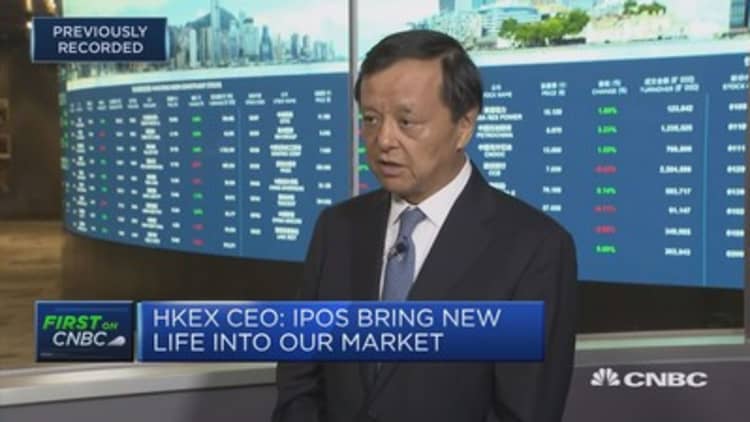
Hong Kong's stock exchange operator posted a rise in first-half net profit to an all-time high, thanks to record revenues from both trading and new listings.
Hong Kong Exchanges and Clearing (HKEX) said net profit for the six months to the end of June rose 44 percent to HK$5.04 billion compared to HK$3.49 billion ($444.62 million) for the same period a year earlier.
Trading fees for the first half were 68 percent higher than a year earlier, as trading volumes rose, and listing fees were 12 percent higher.
"During the first half of 2018, the world's financial markets experienced bouts of volatility following significant corrections across major stock markets. Investor sentiment was dominated by uncertainties over escalating U.S./China trade tensions, geopolitical risk in several parts of the world and policy divergence of major central banks," said Laura Cha, HKEX chairman in the company's exchange filing.
Cha, named to the role in April, said average daily turnover in the Hong Kong securities market was HK$126.6 billion for the first six months of 2018, up 67 percent compared with a year earlier.
In June, HKEX Chief Executive Charles Li was reappointed for a further three years.
The number of IPO deals were 50 percent higher in the first half of the year compared to the same period last year, if transfers from the Growth Enterprise Board to Hong Kong's main board were included, the exchange operator said.
In April, HKEX finalized a major shake up of its listing regime. The new rules allow listings by companies with a dual class share structures, and also by biotech firms that have not yet earned any revenues. The exchange also eased the requirements for Chinese companies listed overseas to do a secondary listing in Hong Kong.
In July, smart phone maker Xiaomi became the first company to list with a dual class structure, while Ascletis Pharma was the first to list under the new biotech rules.

The strong listing momentum appears to have continued into the third quarter.
Earlier on Wednesday, China Tower, the world's largest operator of mobile telecommunications towers, debuted on the exchange, having raised $6.9 billion in the world's largest IPO in two years. China Tower's shares traded broadly flat.
Companies have raised $22.4 billion in Hong Kong through listings this year, the city's strongest seven-month performance, data from Thomson Reuters showed.
In the first half of the year, average daily volume of metals contracts traded on the London Metals Exchange, which is owned by HKEX, rose 28 percent to 764,000 lots.
The board declared an interim dividend of $3.64 per share, accounting for 90 percent of the profit attributable to shareholders.

